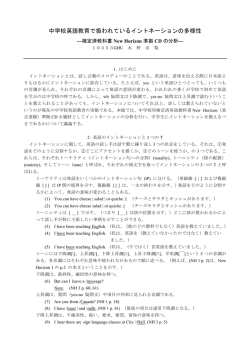
Supplementary Handout
Lesson 9 All Aboard Communication English Ⅱ Supplementary Handout 「コミュニケーション英語Ⅱ」 'Magic of the Cotswolds' ○ Line 3. I have always wanted to see the movie locations. 〔現在完了の継続〕 〔1年10月の既習事項〕 * 現在完了進行形 〔公式〕 過去のある時点から現在までの「動作の継続」を表す時の「動詞の形」。普通、since ~(~から)、 for ~(~間) といった「期間」を表す言葉とともに用いられる。 have (has) been ~ ing ずっと~している (例)I have been living (= I've been living)here for 10 years. (私はここで 10 年間暮らしています。) (例)I have been living (= I've been living)here since 2003. (2003 年からずっとここで暮らしています。) (例)She has been living (= She's been living)in New York for over a year now. * over ~ ~以上 (彼女はニューヨークにもう 1 年以上住んでいます。) (例)Your eyes are red. Have you been crying? (目が赤いけど、泣いてたの?) (例)You are out of breath. Have you been running? * be out of breath 息を切らしてハーハーいっている (息を切らしているけど、走ってたの?) (例)What have you been doing? (今までずっと何をしてたの?) (例)I have been looking (= I've been looking)for you for hours. (もう何時間も君を捜してたんだよ。)* for hours 何時間も (例)It has been raining (= It's been raining)since last night. (昨晩からずっと雨が降っています。) (例)He has been watching (= He's been watching)TV all day. (彼は一日中ずっとテレビを観ている。)* all day 一日中 (例)We have been discussing (= We've been discussing)the issue for 3 hours now. (私たちは、その問題をもう 3 時間話し合っている。) * 現在完了の進行形ではないけれど「継続」を表すケース 〔公式〕 have (has) ~(過去分詞) 過去のある時点から現在までの「(内面的)状態の継続」 を表す場合は普通、現在完了を進行形にはしない。 (ただし例外はある) (例)We have known each other since elementary school. (私たちは小学校の頃からの知り合いです。) (例)She has hated bees since she was chased by them. (彼女は追いかけられて以来、ハチが大嫌いだ。) (例)I have always wanted to see the movie locations. (その映画のロケ地をずっと訪ねてみたかった。) ↑ ずっと知っている ずっと大嫌い ずっと望んでいた 教科書本文 ○ L5. It is the station where Harry departed for a magical world. ○ L17. I will never forget the moment when I came across those houses. ○ L19. I'm going to visit a village where there are a lot of beautiful gardens. 〔関係副詞の where と when〕 〔1 年 2 月の既習事項〕 * 関係副詞の where 〔公式〕 場所を表す名詞 * 関係副詞の where は 「どこ」 という意味ではない。 where S ~(v) S が~する 場所 (例)This was the place where we first met. (ここが私たちが初めて出会った場所です。) * 「ここは~です」 は "Here is ~" ではなく "This is ~" (例)I would like to visit the village where Santa Claus lives and give him a present. He has always been a giver. (サンタクロースの住んでいる村を訪ね、彼にプレゼントをあげたい。彼はいつも人に与えてばかりだから。) (例)Do you know the country where there are more sheep than people? (人の数よりヒツジの数が多い国を知っていますか?) No. What country? (いいえ。それどこ?) It's New Zealand. (ニュージーランドさ。) -1- * 関係副詞の when 〔公式〕 * 関係副詞の when は 「いつ」 という意味ではない 時を表す名詞 when S ~(v) S が~する 時 (例)Do you know the date when we have to submit the report? (レポートの提出期限を知ってる?) * date 期日 (例)Do you still remember the day when we first met? (私たちが初めて出会った日のこと今でも覚えていますか?) (例)I will never forget the time when you and I were teenagers chasing dreams. (僕たちが夢を追いかけていたあの頃を、僕は決して忘れることはないだろう。) * teenagers (who are)chasing dreams 夢を追う若者 ○ L11. look forward to ~ing ~するのを楽しみにする (例)I'm looking forward to seeing you. (お会いするのを楽しみにしています。) (例)I'm looking forward to hearing from you. (お返事をお待ちしております。) ○ L14. date back to ~(時期を表す語句) ~までさかのぼる (例)The cause of global warming dates back to the time when primitive people first made fires to cook their food. (地球温暖化の原因は、原始人が料理を作るために初めて火をおこした時にさかのぼる。) ○ L15. remind 人 of ~ 人 に~を思い出させる (例)A gentle breeze from the sea reminds me of my home far away. (海からのそよ風に吹かれると、遠い故郷を思い出す。) ○ L16. I saw many old houses built of honey-colored limestone. ○ L28. People care about the beautiful scenery surrounding them. 〔過去分詞が後ろから前の名詞を修飾する用法〕 〔現在分詞が後ろから前の名詞を修飾する用法〕 〔1 年 5 月の既習事項〕 * 過去分詞が後ろから前の名詞を修飾する用法 〔 公式 〕 ① ② ③ ④ ⑤ ⑥ 名詞 ~(過去分詞) the pickles made by my grandma a book written in easy English the mountain top covered with snow the man arrested by the police the graffiti painted on the wall the student paged by Mr. Yamada ~された (おばあちゃんが作った漬け物) 直訳=おばあちゃんによって作られた漬け物 (やさしい英語で書かれた本) (雪で覆われた山頂) (警察に逮捕された男) (壁に描かれた落書き) (山田先生に放送で呼び出された生徒) These are the pickles made by my grandma. (これはおばあちゃんが作ってくれた漬け物です。) She is reading a book written in easy English. (彼女はやさしい英語で書かれた本を読んでいる。) The sun is rising from the mountain top covered with snow. (雪で覆われた山頂から太陽が昇ってきた。) The man arrested by the police last night was driving drunk. (昨夜逮捕された男は、酒酔い運転をしていた。) * drive drunk 酒酔い運転をする (例)⑤ Don't forget there is always someone that erases the graffiti painted on the wall. (壁の落書きを消す人がいることを忘れちゃダメだ。) (例)⑥ The student paged by Mr. Yamada is waiting outside the teachers' room. (山田先生に放送で呼び出された生徒が職員室の外で待っています。) (例)① (例)② (例)③ (例)④ * 現在分詞が後ろから前の名詞を修飾する用法 〔 公式 〕 名詞 ~ ing ~している -2- ① ② ③ ④ ⑤ ⑥ a tiny fish swimming in the tank the students resitting the exam the black speck floating in the soup the woman waving at you a mosquito sucking blood the people living on that island (水槽で泳いでいる小さな魚) (追試を受けている生徒たち) (スープに浮いている黒いもの) (あなたに向かって手を振っている女性) (血を吸っている蚊) (その島に住んでいる人たち) * resit the exam 追試を受ける * wave at 人 人に手を振る The tiny fish swimming in the tank looks like Nemo. (水槽で泳いでいる小さな魚はニモみたいだ。) Most of the students resitting the exam are boys. (追試を受けている生徒のほとんどが男子です。) The black speck floating in the soup was a fly. (スープに浮いている黒いものは、ハエだった。) Who is the woman waving at you? (あなたに手を振っている女の人は誰?) You need concentration like that of a mosquito sucking blood.(君には、血を吸っている蚊のような集中力が必要だ。) * that of a mosquito sucking blood = the concentration of a mosquito sucking blood (例)⑥ I'll always remember the people living on that island. (あの島に住んでいる人たちのことを私は決して忘れない。) (例)① (例)② (例)③ (例)④ (例)⑤ ○ L17. come across ~ ~をふと見つける。 ~に偶然会う。 (例)In the woods, they came across a house made of cookies. (森の中で、彼らはお菓子でできた家を見つけた。) ←グリム童話に出てくる話 ○ L25. show 人 around 人 を案内する (例)She showed me around Asakusa. (彼女は浅草を案内してくれた。) ○ L25. I got the feeling that S ~(V) S は~と私は感じた。 S は~という印象を私は受けた。 (例)I got the feeling that they would get back together. (彼らがよりを戻すと私は思っていた。) * break up (付き合っていたカップルが) 別れる * get back together (別れたカップルが)よりを戻す ○ L27. care about ~ ~を大事にする(思う)。 ~のことを心配する。 (例)Everybody has someone to care about. (どんな人にも大切な人がいるんだよ。)←「不定詞の形容詞的用法」を覚えているかな? ○ L30. enjoy oneself 楽しむ (注意) oneself の部分は、主語が I の時は myself、you の時は yourself となる。 (例)Do you enjoy yourself every day? (毎日楽しんでいるかい?) -3-
© Copyright 2026


